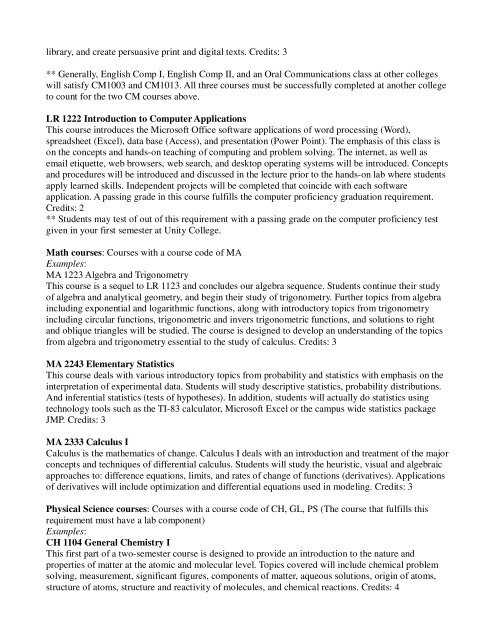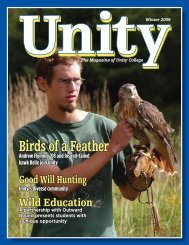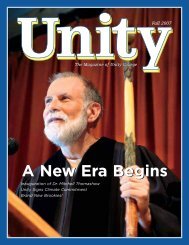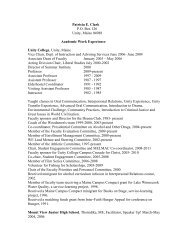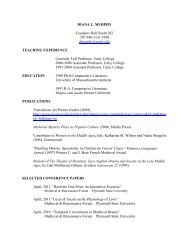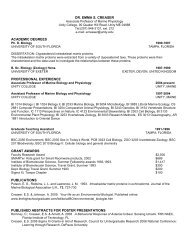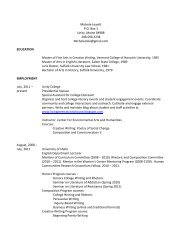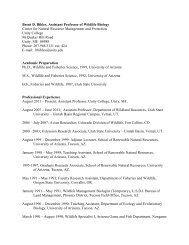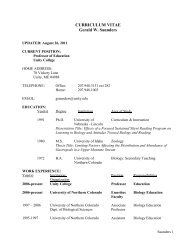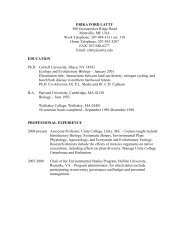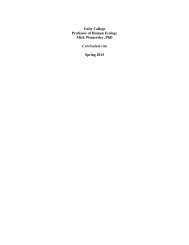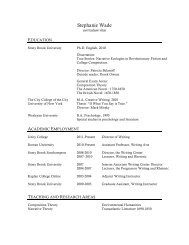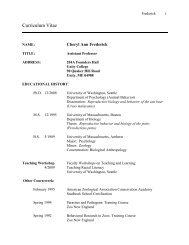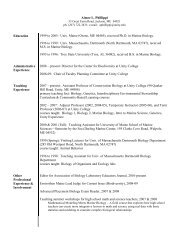Guide - Unity College
Guide - Unity College
Guide - Unity College
Create successful ePaper yourself
Turn your PDF publications into a flip-book with our unique Google optimized e-Paper software.
library, and create persuasive print and digital texts. Credits: 3<br />
** Generally, English Comp I, English Comp II, and an Oral Communications class at other colleges<br />
will satisfy CM1003 and CM1013. All three courses must be successfully completed at another college<br />
to count for the two CM courses above.<br />
LR 1222 Introduction to Computer Applications<br />
This course introduces the Microsoft Office software applications of word processing (Word),<br />
spreadsheet (Excel), data base (Access), and presentation (Power Point). The emphasis of this class is<br />
on the concepts and hands-on teaching of computing and problem solving. The internet, as well as<br />
email etiquette, web browsers, web search, and desktop operating systems will be introduced. Concepts<br />
and procedures will be introduced and discussed in the lecture prior to the hands-on lab where students<br />
apply learned skills. Independent projects will be completed that coincide with each software<br />
application. A passing grade in this course fulfills the computer proficiency graduation requirement.<br />
Credits: 2<br />
** Students may test of out of this requirement with a passing grade on the computer proficiency test<br />
given in your first semester at <strong>Unity</strong> <strong>College</strong>.<br />
Math courses: Courses with a course code of MA<br />
Examples:<br />
MA 1223 Algebra and Trigonometry<br />
This course is a sequel to LR 1123 and concludes our algebra sequence. Students continue their study<br />
of algebra and analytical geometry, and begin their study of trigonometry. Further topics from algebra<br />
including exponential and logarithmic functions, along with introductory topics from trigonometry<br />
including circular functions, trigonometric and invers trigonometric functions, and solutions to right<br />
and oblique triangles will be studied. The course is designed to develop an understanding of the topics<br />
from algebra and trigonometry essential to the study of calculus. Credits: 3<br />
MA 2243 Elementary Statistics<br />
This course deals with various introductory topics from probability and statistics with emphasis on the<br />
interpretation of experimental data. Students will study descriptive statistics, probability distributions.<br />
And inferential statistics (tests of hypotheses). In addition, students will actually do statistics using<br />
technology tools such as the TI-83 calculator, Microsoft Excel or the campus wide statistics package<br />
JMP. Credits: 3<br />
MA 2333 Calculus I<br />
Calculus is the mathematics of change. Calculus I deals with an introduction and treatment of the major<br />
concepts and techniques of differential calculus. Students will study the heuristic, visual and algebraic<br />
approaches to: difference equations, limits, and rates of change of functions (derivatives). Applications<br />
of derivatives will include optimization and differential equations used in modeling. Credits: 3<br />
Physical Science courses: Courses with a course code of CH, GL, PS (The course that fulfills this<br />
requirement must have a lab component)<br />
Examples:<br />
CH 1104 General Chemistry I<br />
This first part of a two-semester course is designed to provide an introduction to the nature and<br />
properties of matter at the atomic and molecular level. Topics covered will include chemical problem<br />
solving, measurement, significant figures, components of matter, aqueous solutions, origin of atoms,<br />
structure of atoms, structure and reactivity of molecules, and chemical reactions. Credits: 4


